Friday, February 20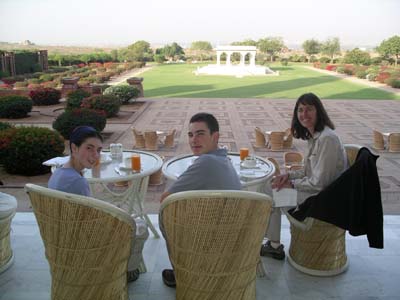
Steve: We started the day with another peaceful meal at the Umaid Bhamal Palace, overlooking the beautiful grounds of this magnificent hotel. We've stayed in some very nice places, but this is probably the most beautiful we've seen. We took several pictures of the grounds and lobby before leaving for the next phase of our journey.
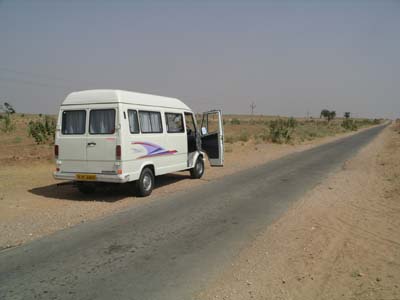 Today
was our longest drive yet - 320 kilometers to Jaisalmer in the very western
part of Rajasthan (only 70 kilometers from the border with Pakistan). The
drive time was over 7 hours, mostly along straight desert roads. Fortunately,
our plan for the day included a stop in the small village of Jamba, giving
us a break in the middle of the trip.
Today
was our longest drive yet - 320 kilometers to Jaisalmer in the very western
part of Rajasthan (only 70 kilometers from the border with Pakistan). The
drive time was over 7 hours, mostly along straight desert roads. Fortunately,
our plan for the day included a stop in the small village of Jamba, giving
us a break in the middle of the trip.
The only noteworthy event on the first leg of our journey was getting pulled
over by a police officer as we left Jodhpur. Rajjan (our driver) was given
a ticket for doing 50 in a 40 kilometers-per-hour zone. Amazingly, the whole
process of getting stopped and paying the 300 rupee ticket only lasted 2 or
3 minutes, and we were on our way again.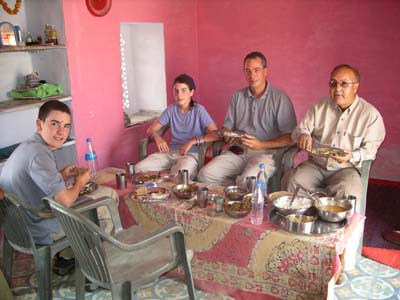
After we arrived in Jamba, we were greeted by the family of the village chief (the chief was scheduled to be there, but was away for family medical reasons). Jamba is a typical desert community, with about 500 families who live both in cement and mud homes. There's a main street, complete with a small "department store", tailor, police station and hospital. We learned from Utpal that each rural village has its own small government, usually headed by a village chief. In Jamba, the chief's family farms a variety of grains and vegetables on 50 acres of land. The farming all happens in the winter, because the summers here in the desert are so unbearingly hot (average of 45-50 degrees Celsius which is about 115-120 Fahrenheit).
After introductions, we were treated to a tasty and very authentic lunch in the chief's home, including a variety of vegetables (Jamba is a strictly vegetarian village). It was interesting to learn about life here in the middle of Rajasthan's Thar Desert.
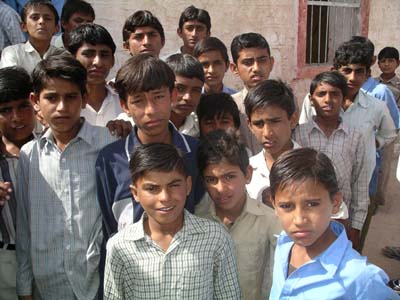 During
lunch, we learned that a festival was being held today in Jamba, celebrating
Lord Vishnu. What an adventure this turned out to be! As we drove up to the
festival, we saw a huge sea of color, made up of large groups of women in
traditional Rajasthani dress. We walked toward the gathering,
During
lunch, we learned that a festival was being held today in Jamba, celebrating
Lord Vishnu. What an adventure this turned out to be! As we drove up to the
festival, we saw a huge sea of color, made up of large groups of women in
traditional Rajasthani dress. We walked toward the gathering, 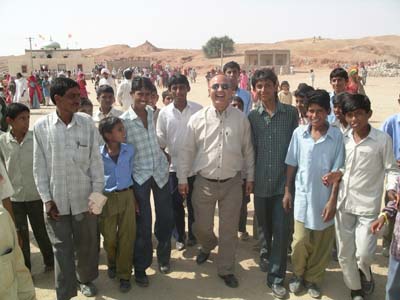 and
quickly became a major source of attention. What started as a small number
of boys who followed us soon became a group of probably 30-40 people. We were
surrounded! Although we had experienced groups of people who stared and wanted
to be close to us, nothing compared with today's scene. At one point, we were
totally surrounded by smiling
and
quickly became a major source of attention. What started as a small number
of boys who followed us soon became a group of probably 30-40 people. We were
surrounded! Although we had experienced groups of people who stared and wanted
to be close to us, nothing compared with today's scene. At one point, we were
totally surrounded by smiling 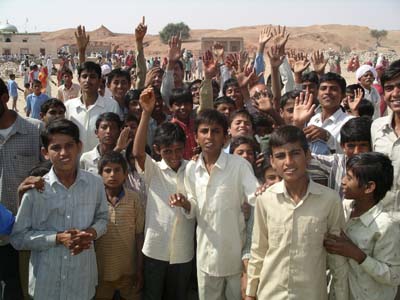 and
laughing men and boys, many asking to have their pictures taken.
and
laughing men and boys, many asking to have their pictures taken.
Fortunatly, Utpal is very experienced in this type of "crowd control", and was often able to divert the group (by telling jokes and stories) so that we could walk short distances unimpeded and take some pictures. However, these diversions didn't last long and our group of "followers" started to become unmanageably large (though we never felt unsafe, we clearly had become way too much of a spectacle). We decided to leave the festival sooner than we would have liked, but not before we took some colorful pictures of the people here.
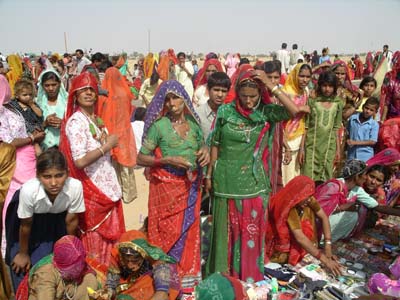
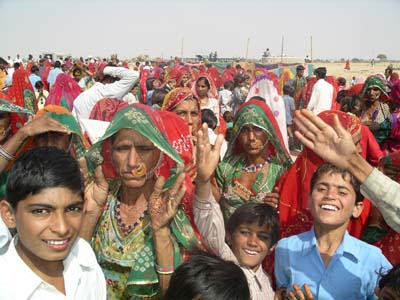
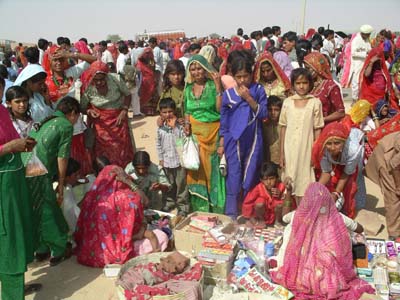
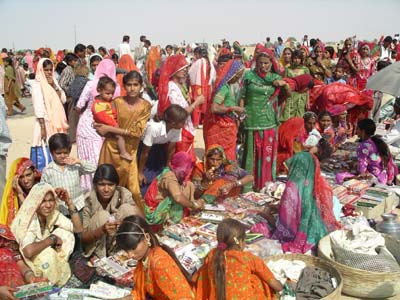
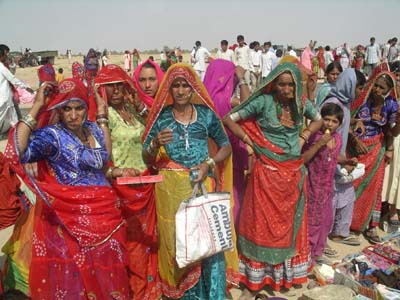
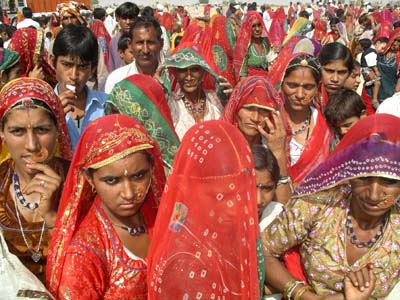
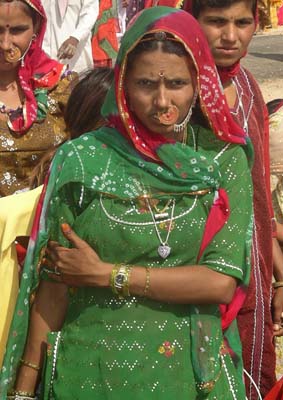
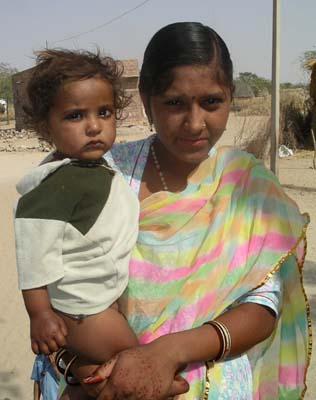
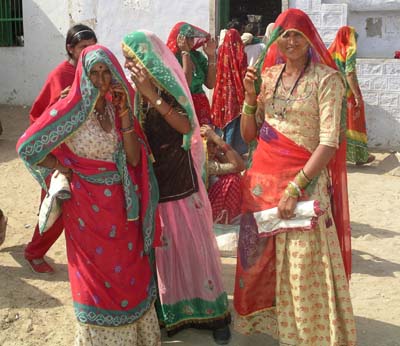
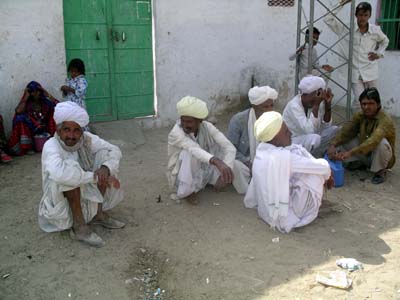
We spent some more time exploring Jamba's village, and particularly enjoyed visiting the tailor where an older man and woman were both working. We took pictures of both of them.
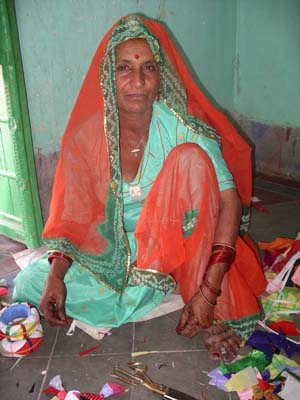
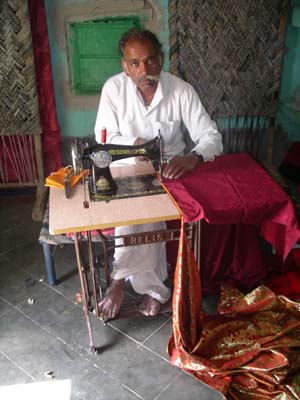
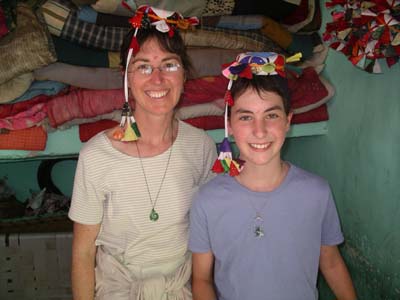
Paula and Katie purchased a couple of the rings that women wear on their heads underneath the baskets, pots and bushels that they carry. We also enjoyed visiting a "department store" whose owner bragged was the largest in the village. The store sells a variety of fruits, vegetables, clothes and items for the home.
We have found visits to small villages like Jamba to be some of our most rewarding experiences here in India, and we took away some very vivid memories from our short stay here today.
The rest of the drive to Jaisalmer was uneventful, except for a few "photo opportunities" where we stopped along the road and took pictures. The best was a group of women who were carrying cow dung on their heads. Although shy at first, they allowed us to take several pictures (especially when we agreed to give them 10 rupees each).
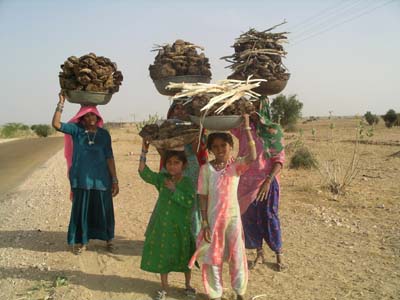
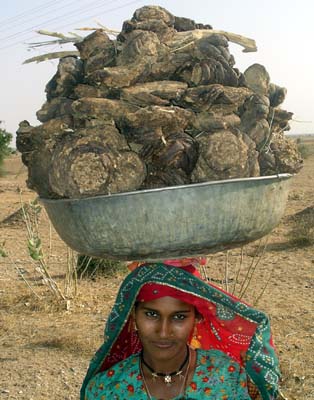
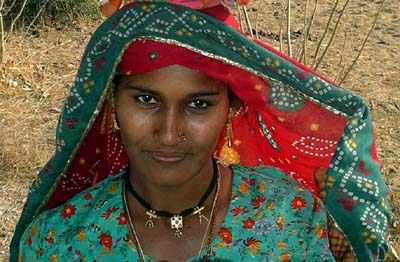
We arrived in Jaisalmer at 6:00, and quickly saw the gold color and intricate carvings that the city is known for. Tomorrow we have a full day planned exploring Jaisalmer and its surrounding areas out here in the desert.
Katie's Kwick Kwacks: The Hindu Religion. On our drive to Jaisalmer
today, we learned a little about the phases of a Hindu's life. The next paragraphs
describe my learnings from our discussion on this topic, and my reaction to
them.
Hinduism, is not so much a religion as it is a way of life. It has no founder, nor any central authority. They basically believe in a creator, Brahman, a destroyer, Shiva, and several other Gods representing various elements in life. There are different phases of a Hindu's life in which a person focuses on practicing a certain aspect of life that is necessary for achieving liberation in the Hindu religion. The first phase of a Hindu's life is for education. The 25 year period is spent gaining knowledge and studies. The second 25-year phase is spent raising and supporting a family until age fifty. The third segment, also 25 years, is spent helping others in your society and the fourth 25-year segment is spent focusing on religion, personal reflection, and preparation for death.
The goal in life according to the Hindu religion, is to reach liberation and escape the cycle of "samsara" (reincarnation). Hindus believe that when you die you are reborn as a new person until you reach freedom from the cycle. Women cannot reach liberation, so they basically live their life and hope to become a man the next time around. The quality of your previous life determines your status in the next, and some are believed to be so evil that they are reborn as animals. We have seen tons of small temples, even little stalls where people are often praying several times a day.
As you can see, religion plays a very major part in the everyday life of Indians. The Hindu belief system is very interesting and it was neat to learn more about it today.
David's Daily Dump: Indian Marriages. Indian marriages are much different
than American marriages and are extremely important in the Hindu religion.
The main difference is that most Indian marriages are arranged by matchmakers,
parents, and astrologists. I'm glad that my parents don't get to choose my
wife!
There are three different ways Indians can be married. The first is an arranged marriage, the second is a "love marriage", and the third is "run-away marriage." Love marriages are basically "love at first sight". Two people meet and decide to become married, but still check their horoscopes with an astrologist and get their parents involved. A run-away marriage is when a couple runs away and becomes married without consulting their parents or an astrologist. Although love marriages are becoming more popular, especially in urban areas, arranged marriages are still the preferred over all others. In fact, 99% of all arranged marriages are successful. That's amazing compared to the millions of American divorces.
There are many steps to the unique arranged marriage process. First someone who wishes to become married (or their parents) visits a matchmaker. The matchmaker then picks out a short list of candidates that are the same caste as the child. After the parents select a good candidate, the parents of the two children meet for a cup of coffee or tea. Then the two children talk on the phone and get to know one another. After that they meet for the first time and get to know each other even better. If they both like each other they can have another meeting and another and even another until they feel totally comfortable with each other. Then they decide if they want to become married. The relationship will only work out if both children say yes. If one child says no, the marriage is cancelled and they keep searching. If both children wish to become married they must first visit an astrologist to check their horoscopes. There is a fifty-fifty chance that the signs will be positive and the marriage will precede. Many marriages are cancelled just because the signs are not good! That would be a bummer to finally find someone you like just to find out that your horoscopes don't match!
When I first heard that most marriages in India were arranged I was surprised and happy that I didn't have to have an arranged marriage. I first thought that the parents pick out someone for you and then force you to marry them even if you don't like them! Now I understand that the children have more power than the parents and can find the person right for them. Even though you do have a lot of freedom in arranged marriages, I am still glad that I can pick my own wife despite how the planets where lined up when I was born!
